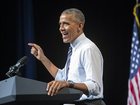For hardliners in Iran, running down the United States has become a lot easier during the U.S. election campaign -- it's just a matter of turning on the television.
 Full Story
Full Story
Southeast Asia faces a growing risk of extremist violence as Islamic State group supporters increasingly work together, but law enforcement agencies are unprepared for the new threat, a report warned Tuesday.
 Full Story
Full Story
The notorious "Jungle" migrant camp on the outskirts of the French port of Calais has for years been a key staging post for migrants trying to smuggle across the Channel to Britain on lorries or trains.
 Full Story
Full Story
The offensive to recapture Mosul from Islamic State jihadists has so far progressed faster than planners anticipated, but military experts fear the fighting could get tougher as U.S.-backed Iraqi forces enter the city.
 Full Story
Full Story
Iraq's Christian community is one of the oldest in the world and the loss of what was once its largest town, Qaraqosh, to the Islamic State group two years ago was a major blow.
News that the town was poised to be recaptured from the jihadists sparked jubilation among Christians who had fled, with many dancing and singing in the city of Arbil.
 Full Story
Full Story
Just three months after seeing off a failed coup, Turkish President Recep Tayyip Erdogan has put right back at the top of the agenda a plan to increase his powers through constitutional change.
The plan to create a presidential system means Turkey is likely to be heading to a referendum in the first half of next year, analysts say.
 Full Story
Full Story
The battle for Mosul is a chance for President Barack Obama to claim an election-year victory over the Islamic State group in Iraq and offset failures in Syria.
Ask the White House about the slow motion catastrophe in Syria and, more likely than not, officials will talk about the different -- if related -- problem of the Islamic State group.
 Full Story
Full Story
A multitude of rival authorities and factions are contesting power amid the anarchy that has gripped Libya since its 2011 revolution which ousted longtime dictator Moamer Kadhafi.
Below is list of the main warring forces.
 Full Story
Full Story
US Secretary of State John Kerry and his Russian counterpart Sergei Lavrov meet on Saturday in Lausanne in the latest bid to ease the bloodshed in Syria.
UN peace envoy Staffan de Mistura will also attend, along with the chief diplomats from Turkey, Saudi Arabia and Qatar -- all backers of Syrian opposition forces.
 Full Story
Full Story
State television threatens the West with nuclear weapons, the Kremlin halts a disarmament treaty, the army warns of shooting down US jets. As ties between Russia and the West have once again slumped, rhetoric in Moscow has peaked.
 Full Story
Full Story



